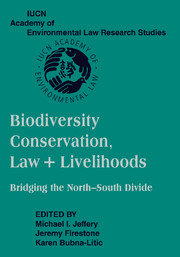 Biodiversity Conservation, Law and Livelihoods: Bridging the North-South Divide
Biodiversity Conservation, Law and Livelihoods: Bridging the North-South Divide Book contents
- Frontmatter
- Contents
- Acknowledgments
- Message from Kofi A. Annan, Secretary-General of the United Nations
- Macquarie Statement
- Contributors
- Introduction
- PART ONE THE CONTEXT
- PART TWO BIODIVERSITY: ITS CONSERVATION
- PART THREE CONSERVATION MEASURES
- PART FOUR USES OF COMPONENTS OF BIODIVERSITY
- PART FIVE PROCESSES AFFECTING BIODIVERSITY
- PART SIX BIOSECURITY ISSUES
- PART SEVEN ACCESS AND BENEFIT-SHARING
- 28 Access, Obligations, and Benefits: Regulating Bioprospecting in the Antarctic
- 29 Biotechnological Innovations, Genetic Resources, and Traditional Knowledge: Current Developments at the World Intellectual Property Organization
- 30 Sharing All the Benefits: The Challenge of Legal Recognition of Indigenous Intellectual and Cultural Property Rights in the Fiji Islands
- Index
30 - Sharing All the Benefits: The Challenge of Legal Recognition of Indigenous Intellectual and Cultural Property Rights in the Fiji Islands
Published online by Cambridge University Press: 31 July 2009
- Frontmatter
- Contents
- Acknowledgments
- Message from Kofi A. Annan, Secretary-General of the United Nations
- Macquarie Statement
- Contributors
- Introduction
- PART ONE THE CONTEXT
- PART TWO BIODIVERSITY: ITS CONSERVATION
- PART THREE CONSERVATION MEASURES
- PART FOUR USES OF COMPONENTS OF BIODIVERSITY
- PART FIVE PROCESSES AFFECTING BIODIVERSITY
- PART SIX BIOSECURITY ISSUES
- PART SEVEN ACCESS AND BENEFIT-SHARING
- 28 Access, Obligations, and Benefits: Regulating Bioprospecting in the Antarctic
- 29 Biotechnological Innovations, Genetic Resources, and Traditional Knowledge: Current Developments at the World Intellectual Property Organization
- 30 Sharing All the Benefits: The Challenge of Legal Recognition of Indigenous Intellectual and Cultural Property Rights in the Fiji Islands
- Index
Summary
INTRODUCTION
There is currently no legal recognition of indigenous intellectual and cultural property rights in the laws of Fiji. Although the Constitution of the Republic of Fiji obligates parliament to make provision for the application of customary laws and for dispute resolution in accordance with traditional Fijian processes, it does not provide for the protection of indigenous intellectual and property rights at the national level. The provision is passive and urges the need for serious attention.
Indigenous cultural rights and intellectual property rights are complementary, fused, and cannot be separated. The very essence of indigenous rights flow from the existence, practice, and innovations of a culture, and such rights are inalienable and indefeasible. They are inherent and owned by the members of an indigenous unit, although, in specific cases, such rights can be owned by an individual member. Protection is vital to the culture and for the economic survival and development of indigenous peoples.
This chapter begins with a discussion of the administration of indigenous property rights in Fiji and the recognition of communal rights by the courts. It then assesses the types of intellectual property recognised and limitations of laws relating to biodiversity and access and benefit-sharing. Pertinent economic issues identified support the establishment of a register at the provincial level and comprehensive supporting provisions in national law that, among other things, provide the nature, extent, and duration of the property right.
- Type
- Chapter
- Information
- Biodiversity Conservation, Law and Livelihoods: Bridging the North-South DivideIUCN Academy of Environmental Law Research Studies, pp. 579 - 592Publisher: Cambridge University PressPrint publication year: 2008


